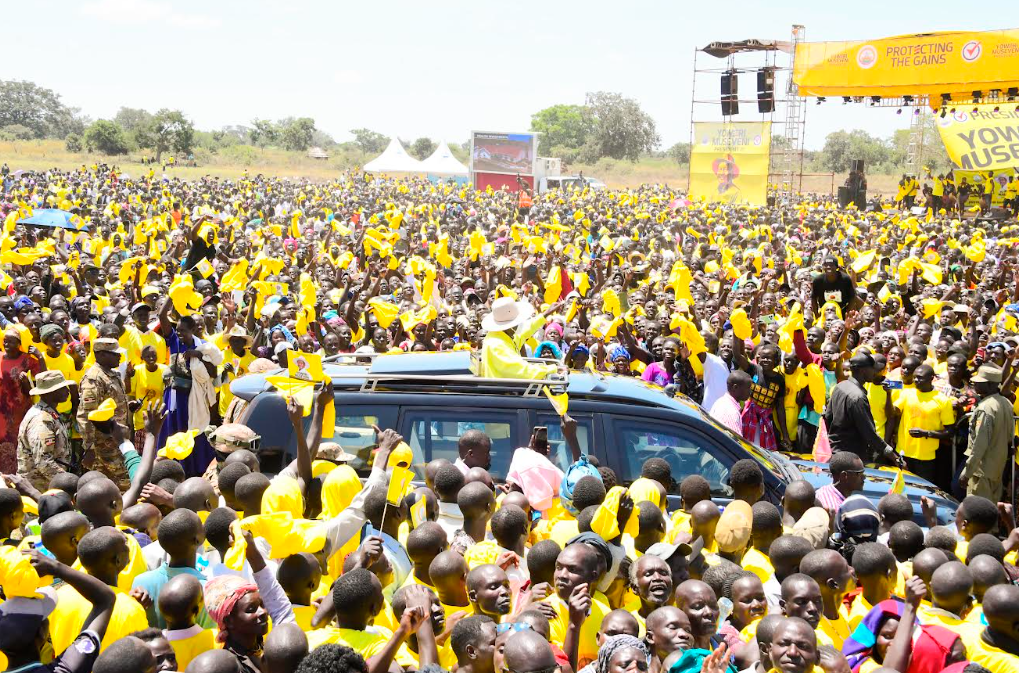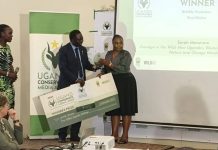President Yoweri Kaguta Museveni, the National Resistance Movement (NRM) Presidential flag bearer, today concluded his campaign rallies in the Acholi sub-region, with the final stop in Agago District.
The President, who now begins his campaign trail in the Karamoja sub-region starting with Abim District, addressed residents on the NRM’s achievements and future plans, emphasizing peace, development, and wealth creation.
The campaign is running under the theme: “Protecting the Gains, Making a Qualitative Leap into High Middle-Income Status”.
Addressing thousands of supporters at Paul Lokech Memorial Grounds in Agago, President Museveni said, “Greetings to the people of Agago. I am here to ask for your support, to share the achievements of the NRM, and to present the plans we have for this nation.”
He briefly introduced the NRM manifesto, promising detailed copies would be delivered to parish levels, but provided a summary highlighting the seven major contributions the NRM has made to Uganda over the last 40 years.
“However, my message to you today focuses on three key pillars: Peace, Development, and Wealth Creation,” he added.
Peace Restored:
President Museveni reflected on the area’s troubled past, marked by rebel activity and cattle rustling.
“The last time I was nearby, in Baralegi, we discussed the issue of cattle rustling. What I discovered then was that the army had the capacity to end the problem, but it wasn’t being fully used,” he said.
He drew an analogy between food and work, saying, “When you want to eat food, you must ensure there’s sauce and water; otherwise, it can choke you. The same applies to work even when you have the capacity, you must use it well.”
The President explained that soldiers had previously been overworked, walking long distances on foot, while rustlers operated from the bush.
“Yet, the rustlers were easier targets when we used air surveillance (UAVs). Today, because we built a strong army and a strong political movement (NRM), peace has returned to this area,” he noted.
He credited local communities for their role in peace, saying: “All of you have contributed by providing information about troublemakers. Through NRM’s politics of unity not sectarianism we have built both peace and strong national institutions like the UPDF.”
Even challenges like elephants destroying crops have been addressed technically.
“Where electric fences have been installed in areas like Queen Elizabeth and Murchison, elephants no longer invade,” President Museveni said.
He also addressed the issue of protected kraals.
“I was surprised to learn that some of you still have protected kraals here. I was guided long ago that only people, not cows, should be in protected camps. People can find food and survive, but cows must graze. Quick communication from kraals to command centers allows UAVs to respond immediately to any cattle theft. For instance, if cows are stolen in Patongo at night, UAVs can track the rustlers until they are captured. This is how technology strengthens our security systems,” he said.
President Museveni also spoke about infrastructure achievements in Agago.
“Electricity used to stop in Lira. I decided that it must be extended all the way to West Nile through Kitgum. At one stage, the Swedish partners who were supposed to fund the transmission lines from Patongo–Kolongo–Adilang withdrew. We said: no problem, we shall do it ourselves. This is why prioritization is key,” he said.
On education, the President noted both progress and gaps.
“Agago has 112 government primary schools and 117 parishes. However, only 42 parishes currently host a government primary school, leaving 75 parishes without one. I have instructed the Minister of Education to study this distribution carefully. Every parish should have at least one government primary school,” he said.
“Agago District also has nine government secondary schools and 12 private secondary schools, all offering Universal Secondary Education (USE) and Universal Post-Ordinary Level Education and Training (UPOLET) with construction of additional Seed Secondary Schools underway.”
President Museveni reminded residents that physical infrastructure alone does not eliminate poverty.
“Do not be diverted by roads, electricity, and other public infrastructure. Those are collective assets; poverty is personal, and wealth is personal. Each individual, family, and company must take responsibility for creating wealth. That is how we achieve total transformation for our people and country,” he said.
He highlighted government programs designed to help Ugandans create wealth, including Entandikwa, NAADS, Operation Wealth Creation (OWC), Emyooga, and the Parish Development Model (PDM).
“These programs are not for the rich; they are for ordinary Ugandans ready to work and improve their livelihoods,” he emphasized.
Agago District NRM Chairperson, Mr. Walter Oketta Ogwang, welcomed the President to the district, saying: “Thank you, Mzee, for your leadership and dedication to serving this nation. Today, you have reached our district, and we are most grateful.”
NRM Impact In Agago:
In Agago District, 36,075 households (53.2% of the total 67,760) have benefited from PDM, with cumulative disbursements of over Shs. 36bn. The Emyooga initiative has reached 17,429 members across 54 SACCOs, with Shs. 2.05bn disbursed.
Cattle compensation has also been implemented, with 1,389 claimants in Agago receiving Shs. 5.83bn.
Agago has 26 sub-counties, with 1,142 villages. Out of 26 sub-counties, 1 has HCIV, 12 have HCIIIs, and 13 sub-counties currently lack health facilities. Planned upgrades include Patongo HCIV to a General Hospital and several HCII upgrades across the district.
Water access has improved, with 817 villages (71%) being served by safe water sources. Urban and rural water projects include piped water in Patongo, Agago, Paimol, and Kalongo, alongside solar-powered water systems in Kotomor and Agengo sub-counties.
Irrigation projects are underway, such as the 12-acre Orama Tebung system in Patongo and 14-acre Odom scheme in Adilang. Plans for the next five years include the Geregere Earth Dam, solar-powered irrigation schemes, and positioning Agago as a regional hub for sustainable agriculture.
President Museveni concluded by urging residents to continue supporting the NRM, use government programs effectively, and actively participate in wealth creation initiatives.
The event was graced by NRM Central Executive Committee (CEC) members, Members of Parliament, religious and cultural leaders, as well as thousands of supporters.























